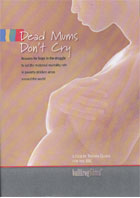
Dead Mums Don’t Cry 2005
Distributed by Bullfrog Films, PO Box 149, Oley, PA 19547; 800-543-FROG (3764)
Produced by Tristan Quinn
Director n/a
DVD, color, 49 min.
College - Adult
Health Sciences, African Studies, Women's Studies, Political Science, Economics
Date Entered: 12/20/2006
Reviewed by Lori Widzinski, Health Sciences Library, University at Buffalo, State University of New YorkThis British (BBC) production looks at the plight of maternal prenatal health and maternal mortality in the African country of Chad, using the Millennium Development Goals as a backdrop. The film focuses on the story of Grace Kodindo, an obstetrician who fights an uphill battle against maternal and newborn mortality in a poverty stricken country that clings to traditional cultural norms that de-value female lives. The sad fates facing many of her patients are mostly preventable with the right equipment and medicines—yet the majority of people can not afford to buy what Westerners would consider standard treatments.
The issues are illustrated beautifully, through several heart wrenching cases including emergency Caesarian sections, eclampsia, and infections resulting from botched abortions. The sheer numbers of births (41 in one day) and maternal deaths are enough to shock the viewer, and to marvel at the resilience and faith of Dr. Kodindo. Pointing to the Millennium Development Goals as a framework to start working on these urgent health problems, Grace travels to Honduras to see how another one of the world’s poorer countries turned around its high maternal and infant mortality rates.
One can easily see how Grace feels overwhelmed and depressed by the state of her clinic, and that the keys to success lie more in the political resolve to make things happen than actual funding. With Chad sitting on oil reserves, the country is poised to add significant money to its coffers—will it help decrease the mortality rates and improve health care for pregnant women and their infants, as well as educate the people on preventative health measures? Political and financial resolve are often easier to change than cultural norms, and improving the status of women seems almost insurmountable.
Dead Mums Don’t Cry has all the BBC’s high production standards, and is recommended for library collections supporting public health, women’s health, African studies, and political science. Only one government official is interviewed, so it could be argued that it is biased, but that seems slight. An important film that deserves a wide showing.